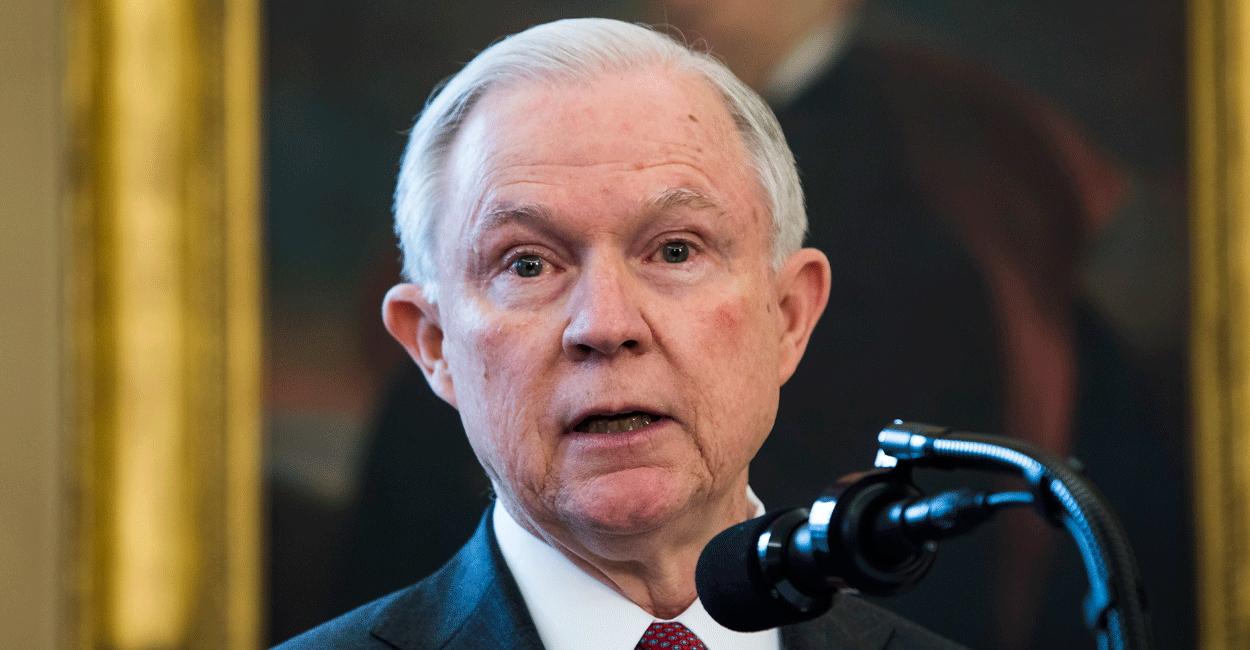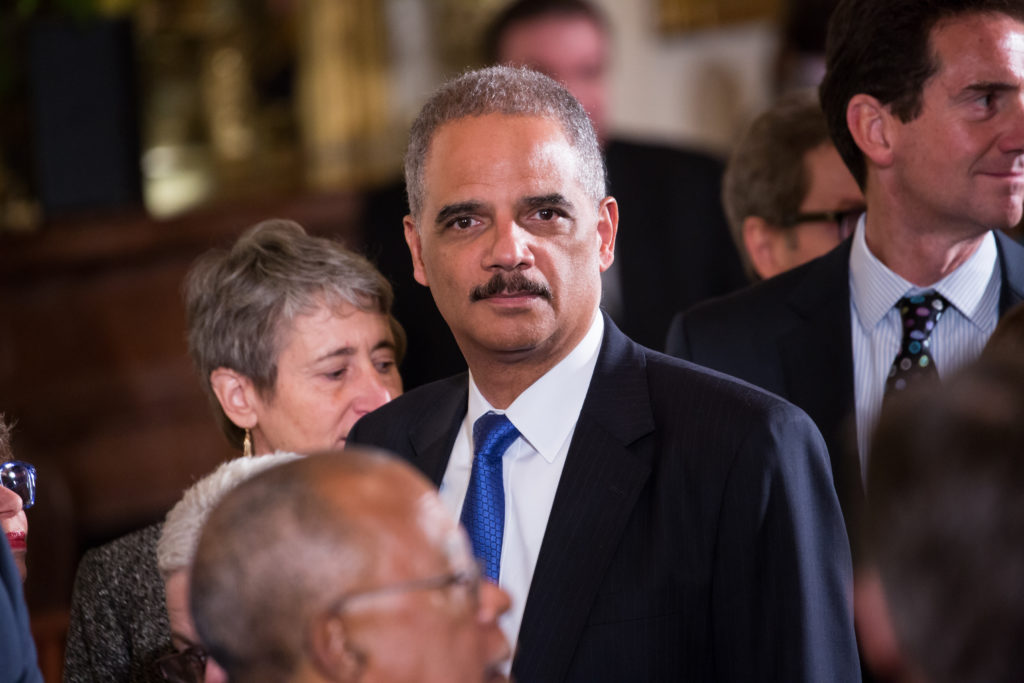Frustrated by a proliferation of leaks early in his administration, President Donald Trump last week said he directed the Department of Justice to open a criminal investigation.
“I’ve actually called the Justice Department to look into the leaks,” Trump said during a 75-minute news conference at the White House. “Those are criminal leaks.”
https://twitter.com/realDonaldTrump/status/832198588201594880
Leaks—an intentional disclosure of secret information, often by an anonymous source—are a normal feature of Washington, but for most of American history the government did not prosecute suspected leakers. According to The New York Times, from the founding of the country through the end of the 20th century, just one person was convicted of leaking, and he later won a pardon.
That changed in the recent administrations of George W. Bush, and more prominently, Barack Obama, as electronic communications trails have made it easier for investigators to determine the source of leaks.
Obama prosecuted more whistleblowers than all of his predecessors combined, including high-profile charges against Edward Snowden, who leaked information from the National Security Agency, and Chelsea Manning, who disclosed files stolen from the Army to WikiLeaks.
But experts say the quantity of leaks under Trump, and the president’s personal request for an investigation, is unusual, and some worry that an early campaign against leaks could exacerbate tensions between the White House and the government bureaucracy, including the intelligence community.
“Every president has been concerned about leaks, and Obama especially ratcheted up pressure on leakers,” said Mary-Rose Papandrea, an expert in national security leaks and law professor at the University of North Carolina, in an interview with The Daily Signal, adding:
There had been concerns after the increase of leak prosecutions under Obama that government people would be reluctant to talk to the press because they were concerned they’d be the next target. But given we are seeing stories coming out now that cite multiple sources revealing information and confirming confidential information, it appears there isn’t such a chilling effect going on.
A Flood of Leaks
The leaks since Trump’s Jan. 20 inauguration have been far-ranging, and impactful.
Trump’s first national security adviser, Michael Flynn, resigned last week after The Washington Post, citing nine unnamed intelligence and law enforcement sources, reported that Flynn had discussed U.S. sanctions against Russia during December communications with the Russian ambassador, then misled Vice President Mike Pence about the conversations.
>>>After Michael Flynn’s Departure, How Trump Can Stabilize National Security Council, Avoid Leaks
Drafts of executive orders, including ones Trump hasn’t issued yet, have circulated around Washington. Transcriptions of Trump’s conversations with foreign leaders have been published in news reports.
And late last week The Wall Street Journal, citing anonymous “current and former officials,” reported that the U.S. intelligence community has limited the information it provides to Trump. A White House official disputed this report, telling The Wall Street Journal: “There is nothing that leads us to believe that this is an accurate account of what is actually happening.”
Trump repeatedly questioned the performance of intelligence agencies during the campaign and before being inaugurated.
https://twitter.com/realDonaldTrump/status/816452807024840704?ref_src=twsrc%5Etfw
Republicans in Congress have allied with Trump in calling for investigations of leaks.
“There should be an investigation as to the leaks of information leaving—wherever they’re coming from,” House Speaker Paul Ryan R-Wis., said last Thursday. “If it’s classified information, that is criminal and there should be a criminal investigation of these leaks.”
Last Wednesday, House Oversight Chairman Jason Chaffetz, R-Utah, and House Judiciary Chairman Bob Goodlatte, R-Va., sent a letter to the Justice Department’s inspector general, urging him to investigate whether leaked, classified information had been “mishandled.”
Questions of Independence
The FBI, under the supervision of the Department of Justice, can carry out an independent investigation and has done so before, as it did in the 2003 case involving the revelation of Valerie Plame as a covert CIA operative.
Attorney General Jeff Sessions, who was questioned in his confirmation hearings by Democrats about his close ties to the Trump campaign, holds the authority to decide whether to allow a leak prosecution case to move forward, depending on the evidence the FBI brings him.
“For a sensitive matter like this of such great import, the attorney general would clearly have to sign off on an investigation,” said Cully Stimson, a former prosecutor who manages the National Security Law Program at The Heritage Foundation. “If he didn’t want it to move forward, it wouldn’t move forward. He would have to exercise prosecutorial discretion to decide whether there’s enough evidence to move forward with it.”

Attorney General Jeff Sessions holds the authority to decide whether to allow a leak prosecution case to move forward. (Photo: Jim LoScalzo/DPA/Picture-Alliance/Newscom)
Patrick Eddington, a policy analyst in homeland security and civil liberties at the Cato Institute and a former CIA analyst, said he doubted Sessions would recuse himself from an investigation.
“Sessions will catch slings and arrows no matter what he does,” Eddington told The Daily Signal. “It’s difficult for the attorney general to recuse himself from a decision about a particular investigation unless there’s a specific reason he would be compromised from a conflict of interest standpoint. It’s difficult to make that case here.”
‘Many Opportunities’ to Prosecute Leakers
The government has a range of criminal statutes to use against leakers, including the Espionage Act of 1917, which prohibits the improper accessing, handling, or transmitting of “information respecting the national defense” with the intent of injuring the U.S. or aiding a foreign nation.
Another related statute prohibits disclosure of classified information, including information “concerning the communication intelligence activities of the United States or any foreign government.”
“Although there is no general law that criminalizes the disclosure of classified information, the law provides many opportunities for charging leakers, and the requirements for prosecution are rather minimal,” Papandrea said.
However, even with a more active campaign against leakers in recent years, experts say it’s challenging to successfully prosecute.
“It’s extremely difficult to prosecute leak cases,” said David Shedd, a Heritage Foundation visiting fellow who held intelligence policy positions at the National Security Council under George W. Bush, and was also a deputy director of the Defense Intelligence Agency in the Obama administration. “The challenge begins in finding the leaker. If and when a suspect is narrowed down, revealing potentially sensitive information related to an effective prosecution can also be a disincentive to prosecute a leaker.”
The task may become even tougher, as leakers and journalists are increasingly using secure apps like Confide, Telegram, and Signal—in which messages are automatically deleted—to communicate.
It’s unknown if these apps were used in the recent leak cases.
“It will be interesting to see whether folks engaged in this kind of leaking have been trying to cover their tracks by using this technology,” Eddington said. “If that’s the case, it could be much more difficult for the bureau [FBI] to make an ironclad case.”
Stopping Leaks
According to Papandrea, beyond pursuing prosecutions, the Obama administration implemented various policies to deter leaks.
She said the administration imposed rules to prevent certain executive branch employees from talking to the media without authorization, and increased surveillance of government email accounts.
Responding to criticisms that the Obama administration targeted the press—including the Associated Press and Fox News reporter James Rosen—as part of its crackdown on leaks, then-Attorney General Eric Holder tightened controls over the ability of prosecutors to subpoena the phone and email records of journalists.

In the Obama administration, then-Attorney General Eric Holder made it more difficult to include journalists in prosecutions against leakers. (Photo: Cheriss May/NurPhoto/Sipa USA/Newscom)
The government never has prosecuted a journalist for publishing leaks in the 100-year history of the Espionage Act.
“We hope that in his zeal to go after leakers, President Trump remembers and respects the independence of the news media,” said Charles D. Tobin, a Washington lawyer who represents journalists, in an interview with The Daily Signal.
A senior Trump administration official told The Daily Signal last week that the White House has “changed its internal procedures” to prevent leaks. This official insisted Trump would not seek to punish journalists who publish leaked information.
Ongoing Tensions
Trump, in his news conference, suggested that he thought the leaks were coming from officials in government “agencies” who were holdovers “probably from the Obama administration,” rather than “our new people.”
Experts note that it’s not unusual for government employees left over from the prior administration to publicly disclose displeasure with the new president’s policies and team.
Yet the high pace of leaks, and the politicized discussions surrounding them, have some speculating that the government bureaucracy could “rise up” against Trump to undermine him.
“I would hesitate to say there is some sort of organized campaign to leak and destroy the administration,” Papandrea said, adding:
There may well be people leaking with the goal of dethroning Trump, but just as well there is a possibility some of the leaks may be designed to help Trump, to prevent him from making mistakes. Given the way he listens to the media, they may feel like the most effective way to speak to him is through the press.
Though some leaks may produce social and national security costs, experts say, an aggressive project to counter leaks inadvertently could stifle information flow within the government, and isolate the White House from agencies whose expertise it needs to govern.
“An aggressive counterleak culture driven by a president can lead to insularity and a reluctance by the professionals to speak up,” Shedd said. “Information and advice might well be withheld. The goal of a healthy interagency policy development process is to identify differences where those exist and areas of common ground. Policymakers enabled by a well-functioning system built on trust will give the president the best possible recommendations under that model.”




























